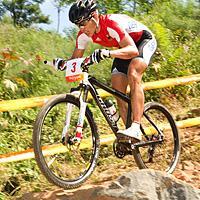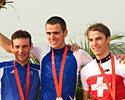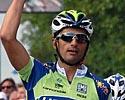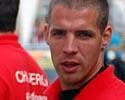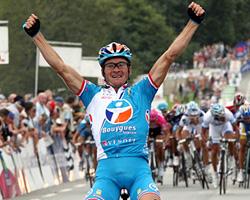First Edition Cycling News, August 24, 2008Edited by Laura Weislo MTB wraps up Olympic cycling eventsBy Rob Jones in Beijing
Cycling at the Beijing Olympic Games concluded with the mountain bike cross-country on Saturday. Both the men's and women's races were held on the same day, after the women's race was postponed because of 'unsafe' conditions due to rain on Thursday. The new Olympic champions were the dominant riders in both races, leading from the first lap. Sabine Spitz (Germany) took the women's title, while Julien Absalon (France) became the first man to successfully defend the Olympic mountain bike title. The weather was possibly the best seen thus far in Beijing for the Games, with blue skies, a slight breeze and temperatures in the low 30s (Celsius). The ground was almost completely dried out from the soaking two days earlier, leaving a hard and fast track. The women did six laps and the men eight on the 4.5 kilometre course. Spitz fulfilled her dream of an Olympic gold medal by dominating the field early on. Silver went to Polish rider Maja Wloszczowska and Irina Kalentyeva (Russia) scored the bronze medal. The best Chinese rider was Chengyuan Ren in fifth place, 2'29 back. The race in the unforgiving Beijing heat on a very technical course saw some of the pre-race favourites drop out early. Margarita Fullana (Spain), Gunn-Rita Dahle Flesjaa (Norway) and Marie-Helene Premont (Canada) all were not able to finish the race. Spitz had a good start and was at the front together with Fullana and Wloszczowska. Only a half lap (of six) into the race Spitz put in a very strong move. She completed the first lap 4.3-kilometre lap in 16'51, 21 seconds faster than her closest competitors. From there Spitz kept pulling away until she held a commanding lead of around 50 seconds until the end, giving her an extremely gratifying win. "I felt pure joy that I had finally achieved this goal after so many years of hard work. Winning the gold medal at the Olympics is the crowning glory of a career."
It was almost expected that Julien Absalon would win his second Olympic gold medal in the men's cross country race and Absalon delivered. The surprise came from his compatriot Jean-Christophe Peraud, who stormed to a silver medal, a minute after Absalon celebrated his win. The Swiss duo of Christoph Sauser and Nino Schurter delivered an exciting battle for bronze, with Schurter edging out Sauser by a few seconds. The Laoshan mountain bike course was criticized after the test event last year for being too easy, but the riders should have been careful what they asked for, as the re-designed track was far harder than anyone had anticipated. "It's the most complicated, difficult technical race. There were lots of stones and no time to rest," Absalon said after the race. Peraud agreed that it was one of the hardest courses he'd ever ridden. "After I finished, I was so tired that I had to take a rest, because I couldn't feel my legs anymore," he said. Absalon was impervious to the numerous steep and rocky descents which spelled the end of many of the favourites' races. Even Switzerland's Christoph Sauser, the reigning world champion, had to concede the race to his 22-year-old team-mate Nino Schurter, who took the bronze. Absalon topped Schurter as the rider to beat in London in four years' time. Continue to Cyclingnews' full coverage of the men's and women's mountain bike races. Bennati takes over in BeneluxBy Susan Westemeyer
Italian Daniele Bennati powered to his first win since the Giro d'Italia on the Eneco Tour's third stage. The Liquigas sprinter bested stage one winner Tom Boonen and Belgian champion Jürgen Roelandts to slip into the overall lead thanks to the ten second time bonus on the line ahead of Team Columbia's Edvald Boasson Hagen. The morning's leader José Iván Gutierrez (Caisse d'Epargne) gave up his hold on the overall at the final intermediate sprint, where the young Norwegian Boasson Hagen took three bonus seconds. Bennati was happy with his victory over Boonen. "I am proud because it is the first time that I have beaten him," the Italian said. "What my team did at the end was impressive." "This gives me confidence for the Vuelta, especially because I know I will face Boonen and Quick Step there," he added. Boonen took his loss philosophically, saying that once again his lead-out train was not well-coordinated, and ended up two men short at the end. "Winning is not the only thing, it is also important to have a good feeling," he said. "My sprint is good. But the mechanism must get better." Continue to the full report, results and photos. Volunteers scramble to chaperone Regio Tour doping controlsBy Bjorn Haake in Gundelfingen
The UCI is trying everything it can to make doping controls as efficient as possible. But sometimes, a simple thing like not having enough volunteers can impede the anti-doping protocol, even in a UCI 2.1 race. In the fourth stage of the Regio Tour, a time trial, a lack of helpers left the chaperones running and sweating. The so-called chaperones are supposed to stay with riders from when they finish the race until the doping control. Unlike in road stages, a time trial is worked differently. There are two ways a rider can get called upon by the chaperones. If the rider was selected randomly, they can be led to the doping control immediately after the finish. Things get trickier with the ruling that the stage winner (or overall leader) is to be tested. It means when a rider comes in with a new best time he will have to be supervised until a different rider is faster. This is when the so-called hot seat comes into play. The potentially temporary number one rider will be seated in a chair on the podium until someone else is faster or the race is over. In the latter case they will get the podium kisses and ceremony, then be led away to the doping control. When Grischa Niermann came in with a 17'59 and a new best time in the Regio Tour's stage 4, he still had a lot of speed. He turned right, heading downhill to the Rabobank bus and unlikely able to see the chaperones waiting at the barriers. So one of them had to sprint after Niermann for a good 300 metres. Niermann had already gone inside the bus to get some drinks. With the bus door open, the chaperone was patiently waiting outside and explained that the situation wasn't abnormal. "You have to let them change at least. He will be placed on the hot seat after that." However, the chaperone started to get a little bit nervous for a different reason. "I am assigned a random rider, Sergey Firsanov. He will be coming in soon. We are all volunteers, but there aren't enough of us." Since the bus door was open and the rider visible, it is unclear if any regulation was violated. Riders do have 30 minutes from the finish of their race to the doping control. Niermann easily made that time cut. It was the second time of the day that he beat the clock. He also won the stage, the only rider faster than 18 minutes. French stars race to cycling's heartlandBy Ben Atkins
French hero Thomas Voeckler returns to defend his Ouest-France title at the head of a Bouygues Telecom team packed with rouleurs of similar quality. The rider from Martinique is aware that his 2004 Tour heroics are growing long in the memory, and that other French riders like Agritubel's Romain Feillu are appearing to steal his place in his nation's hearts. He knows, however, that victories in races such as this in France's cycling heartland will keep his place in the sun that bit longer. Riders like former French champion Pierrick Fedrigo, and 2006 Clásica San Sebastian winner Xavier Florencio are at hand though to make sure that the Bouygues Telecom challenge is more than just a one man show. The race covers 12 laps of the same 19.1km course as last year to make up a total of 229.2km. Despite never looking too challenging on paper though, the race seldom finishes in a bunch sprint; the final drag inside the final few kilometres offering opportunities to the breakaway riders, as happened with Voeckler last year. The sprinters were not too far behind the French echappeur though, and with a strong determined team behind him one of the fast-men could yet do it. The rest of last year's podium is missing from the start of this year's event though. Thor Hushovd (Credit Agricole), last year's second place, was sick during the Tour and missed the Olympic Games as a result. The rest of the team will be eager to impress though, as Directeur Sportif Roger Legeay has yet to find a new sponsor for the team and a good performance may either help to attract one, or more likely help the individual secure a contract with another team next year. Christophe Le Mevel leads the team, but local boy Sebastien Hinault (no relation to the five-time Tour winner Bernard) will be out to impress in his home region. Also missing is last year's third place Danilo Di Luca as his LPR Brakes-Ballan team has not received one of the two wild cards for the race. The ailing ProTour continues and we now have two races at once as the Eneco Tour of Benelux runs in parallel. The overall leader Alejandro Valverde (Caisse d'Epargne) is notable in his absence as he rests after the Olympic Games. In fact none of the top three in the season-long competition are racing in either of the current ProTour races, which perhaps shows the relative importance of the series. The highest ranked rider in either race is Andre Greipel (Team Columbia), who sits in sixth place and is riding the Eneco Tour; the highest ranked rider to start here in Plouay is 11th-placed Haimar Zubeldia (Euskaltel-Euskadi). Continue to the full men's preview. See also the women's World Cup preview. Wegelius to Silence-Lotto?After four seasons with the Italian Liquigas team, Briton Charlie Wegelius may be moving over to the Silence-Lotto squad. The 30-year-old could be a valuable mountain domestique for Cadel Evans in the Tour de France. Sportwereld.be reported that the rider received an offer from the Belgian squad, but has yet to sign. "We want Wegelius very much, because he's a fantastic rider," said Silence-Lotto director Roberto Damiani. "He is someone who can ride well in the medium mountains, and on a good day can even handle the high mountains. In the last Tour, we have seen that Evans needs such men to help him in those stages." Klöden to skip national tourTeam Astana's Andreas Klöden will not ride the Deutschland Tour, choosing instead to help his team gain its second Grand Tour victory in the Vuelta a España. Klöden explained that this is a major objective for his team, which was denied entry into the Tour de France despite having the defending champion among its ranks. After a discussion with his team's directors, it was decided that the German would benefit the team more in Spain. "For Astana, the Vuelta, as one of the three major tours per year is very important, and we want of course to win," said Klöden. "We will make every effort to put in a strong performance with a good team," said the 33-year-old. "The first week I will use to warm up. I hope that I can play a vital role in the decisive stages and make an important contribution to support the team." Klöden helped Alberto Contador win the Giro d'Italia before dropping out on the second to last stage with a fever. He returned to racing this month after an extended break following the Tour de Suisse. Cars trouble the pro pelotonTwo separate incidents this week pitted cars against professional cyclists, but in each case the riders emerged relatively unscathed. In Spain, Caisse d'Epargne riders Joaquim Rodriguez and Alberto Losada were training for the Vuelta a España in the mountains near Seu d'Urgell when a motorist traveling in opposite direction suddenly made a sharp turn in front of them. The two hit the Renault Clio, with Losada receiving the brunt of the impact. A trip to the medical centre revealed no broken bones, but both riders suffered road rash and bruises, and Losada's bike was shattered. Both are expected to take the start of the Tour of Spain next Saturday in Granada. In the Netherlands, it was an aggressive driver who troubled riders as they were warming up for the prologue of the Eneco Tour on Wednesday. According to the Dutch press service AD, members of the Astana team were assaulted by an angry driver. The 62-year-old driver pulled up alongside members of the Astana team, honking his horn. When the team's Swiss rider Steve Morabito questioned the driver, the man opened his door, causing Morabito to crash. When his team-mate Benoît Joachim confronted the angry motorist, he received a punch in the face. The team's Dutch rider Koen de Kort gave the account of the incident, saying that the other riders at the scene called the police, but were careful to stay out of the scuffle. "I can just see the headlines now: 'Astana-team beat up 62 year-old man'." Llaneras to fly Spanish flag at closing ceremoniesOlympic points race champion Joan Llaneras will hold the Spanish flag at the closing ceremony of the Beijing Olympic Games on Sunday. The rider from Majorca, who also took the silver medal in the Madison with partner Toni Tauler, became the top Spanish Olympian with four career medals. He previously took gold in the points race in Sydney, and silver in the same event in Athens. He announced after taking his gold medal that he would retire from the sport after the Games. Llaneras has been world champion four times in the points race (1996, 1998, 2000 and 2007) and three times in the Madison (1997, 1999 and 2006). (All rights reserved/Copyright Future Publishing (Overseas) Limited 2008) |

|
January 2009 |
Recently on Cyclingnews.com |

